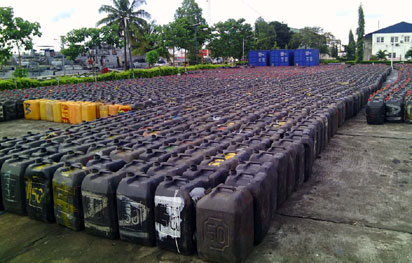
Nigeria lost approximately N995 billion last year to large-scale oil theft in the Niger Delta region, findings from a new report have shown.
The report was commissioned by the Nigeria Natural Resource Charter (NNRC), a non-governmental organisation which provides policy options to guide governments and societies in their use of natural resources for maximum and sustained returns for citizens.
Highlights from the report shared with journalists at a workshop in Abuja, yesterday, estimated the value of total losses suffered by Nigeria through the various methods by which oil is stolen from the Niger Delta to be higher than the current combined allocations for health and education in the 2018 budget.
The combined allocations for health and education amounts to N894 billion, which translates to a mere 8.4 per cent of the estimated value of losses from oil theft two years ago.
Analyst Dawn Dimowo shared insights on the report whose full content will be released later in the year.
In the report titled “Oil Theft in Nigeria,” the NNRC urged the Federal Government to address oil theft with the urgent attention it deserves and intervene with more effective action.
The report focused on the consequences of weak governance structures on the Nigerian economy and the Nigerian people. It also provided credible information on revenue losses from oil theft and its impact on the economy and the average Nigerian.
It identified poverty, unemployment, poor governance and pervasive corruption and the neglect of the Niger Delta region as major reasons for the emergence and sustenance of oil theft over time.
The report recalled that in 2016, both government and oil companies indicated that up to N3.8 trillion were recorded as losses from crude oil theft, sabotage and pipeline vandalism, principally as a result of the force majeure declared at the Forcados terminal combined with wider pipeline infractions and theft. The government’s share of this loss was approximately 42 per cent or about N1.6 trillion.
The report noted; “The Nigerian government passed a record budget of N9.12 trillion for 2018 with a revenue target of N7.2 trillion most of which it aims to achieve from the petroleum sector… At a time when the country has just exited a recession and the economy remains fragile. With national debt on the rise, reducing oil theft should clearly be an urgent national priority.”
The report said though oil theft is as old as the Nigerian oil industry, the level of pilfering remained insignificant till the 1970s.
However, “as the stakes get higher over time and with global oil prices rising above $100 a barrel in the early 2000s, oil theft evolved into a cottage industry creating consequential socio-economic problems,” it said.
It added that “over the last decade, oil theft has risen to unprecedented levels, peaking between 2011 and 2014. The inability of the government and oil companies to curb this epidemic has made Nigeria the country most plagued by oil theft in the world.”
It noted that complicity between state actors, oil companies and militant elements in incidents of oil theft are well documented after several investigations.
The report concluded that based on the NNRC’s three petroleum sector assessments; conducted and published in its 2012, 2014 and 2017 Benchmarking Exercise Reports (BERs), Nigeria’s “policies, legal and institutional frameworks have remained incapable of addressing the revenue losses and attendant environmental damage holistically and sustainably.”